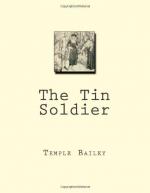A gasp went round the table.
“They were Belgian children.”
That night Jean said to Derry with a sternness which set strangely upon her, “We must have friends in our House of Dreams. The latchstrings will always be out for people like Emily and Marion, and Drusilla, and Ulrich and Ralph—”
“Yes—”
“But not for Hilda and Alma.”
THE NINTH DAY
It was on the ninth day that Derry waked his wife at dawn. “I’ve ordered the car. It rained in the night, and now—oh, there was never such a morning; there may never be such a morning for us again.”
“What time is it, Derry?”
“Sunrise time—come and see.”
Her window faced the east, and she saw all the pearl of it, and the faint rose and the amethyst and gold.
“We shall eat our breakfast ten miles from town,” Derry said, as their car carried him out into the country, “and there’s a lovesome garden—”
“With old-fashioned flowers and a fountain and a Cupid?”
“With all that—and more—”
The garden belonged to an old woman. For years and years she had planted flowers—–tulips and hyacinths and poppies and lilies and gladiolus and larkspur and phlox and ladyslipper—there had always been a riot of color.
She had an old gardener, and she would stand over him, leaning on her silver-topped ebony cane, with a lace scarf covering her hair, and would point out the places to plant things.
But now in her garden she had strawberries and Swiss chard and sweet herbs, and rows and rows of peas and young onions and potatoes, with a place left for corn at the back, and tomatoes in every spare space.
And there was lettuce, and an asparagus bed, and everything on this May morning was shouting to the sun.
“I had always thought,” said the old lady to Derry, when he presented Jean, “that a vegetable garden was uninteresting. But it is a little world—with class distinctions of its own, if you please. All the really useful vegetables we call common; it is the ones we can do without which are the aristocrats. The potatoes and cabbages and onions are really important, but I am proudest of my young peas and my peppers and cucumbers and tomatoes, and that’s the way of the world, isn’t it? If there was only an aristocracy things would stop, but the common folk could go on alone until the end of time.”
She gave Jean a blue bowl to pick strawberries in; and Derry dug asparagus—the creamy shoots were tipped with pale purple and pink, deepening into green where they had stood too long in the sun.
“Aren’t there any flowers?” Jean was anxious.
“Come and see.” The old woman went ahead of them, her cane tap-tapping on the stone flags.
She opened a gate which was flanked by brick walls. “These,” she said, whimsically, “are my jewels.”




